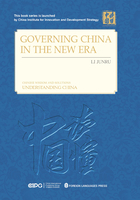
State governance is a key research topic on which China, a vast country with a 1.3 billion population, an extended history, and rich cultural heritage, must focus in her modernization process. Based on the hands-on experience of governing China since reform and opening up in 1978, and especially since the CPC's 18th National Congress in 2012, and through the analysis of the subject and object of state governance and their interrelated characteristics, this book introduces the five relationships that need to be balanced: between convictions, ideals, and goals; between governing the Party, the country, and the military; between governance institutions, system, and capacity; between democracy, rule of law, and rule of virtue; and between the CPC's leadership and government, market, and society. Through the analysis of these five relationships, the book explains how the national governance system of socialism with Chinese characteristics upholds democratic centralism under the leadership of the CPC.